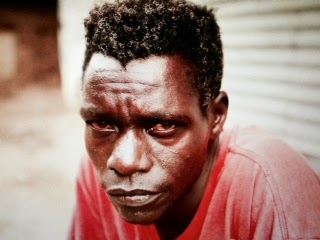“Eeeeeeeeeeekkkkk!!!” The sound comes from me - I can’t help it. It’s an ancient reflex that rings far in our reggae-playing, relaxed beach hut. I’ve just spotted something that looks like a white rat nimbly climbing up the ceiling disappearing somewhere behind the weaved palm texture. I hate rats but even so the irony of screaming at the sight of a tiny rodent after arriving here from a safari at the Maasai Mara that was filled with lions, cheetahs and crocodiles doesn’t go amiss.
We’ve finished our shoot now and after a three-day wildlife safari on the Maasai Mara we’re in Zanzibar, the beautiful spice island on the coast of Tanzania. But getting here wasn’t simple: “Is there a problem?” Dave asks the check-in officer at Nairobi Airport as she types frantically into her computer refusing to make eye contact. The clock is nearing midnight and our plane is departing in an hour. “Perhaps the plane is full and we’ll get free first class flights anywhere in the world,” I muse to Dave. I have seen this happen many a times while filming a programme about airports so I know it’s not a made-up urban legend. Finally the check in woman looks at us: “Your tickets are void,” she says cutting her sentence short without emotion. There’s neither an apology, nor an offer of free flights. Dave and I look at each other. “And what will you do to fix this?” I ask. “Nothing, it’s not our fault,” she stares back at us, bored. And despite the next two hours spent arguing with ticket officers, duty managers and supervisors the best that we can do is return to our hotel and beg for our room back, book the next flight in 24 hours and hope that Opodo will boot the bill when their customer service centre opens the next day.
Cue transit time: late night room service, the looping news of BBC World, sleep cut short by early morning echoes from the hotel lobby. But then, to our surprise, Opodo apologises unreservedly and we shuttle ourselves back to the airport; Zanzibar is beckoning us after all and so finally it’s time to lay down our film producer’s hats and entrepreneur’s cloaks, remove the veil of stress and reveal some serious trucker’s t-shirt tan lines; we’re going to the beach!
But perhaps because of our delay time feels precious and making a beach bum out of a telly producer isn’t as easy or instantaneous as I hoped. I diligently swim, tan, do yoga and get drunk on a combination of local beer and rum cocktails, yet still feel a familiar London neurosis in me, that Fear Of Missing Out. We meet other travellers, glowing honeymoon couples and independent explorers, full of stories about finding secret paradise beaches and chance meetings with wild dolphins. There are so many options on what to do and to think that someone else is having a better time than you - well, that’s the best way to ruin a holiday. “Comparison is the thief of joy,” says Dave as I mull over all the possible should-haves, could-haves and would-haves. He’s right of course, but once you’ve started how do you stop?
The next day we book ourselves on a tour around the island and its beaches. On our way back the bus brakes to a sudden halt in the middle of the road. The driver has spotted some red colobus monkeys that are some of the rarest animals in Africa. The whole bus load of tourists, all twenty of us, cram to the windows and clamber on top of each other to catch a glimpse of these rascals while they look back at us without reaction, relaxed, bemused. For just a second I stop and see myself through the eyes of all the animals who’ve seen me on this journey, the lions on the safari, lazy and content, sleeping sixteen hours a day, the white rat in our beach hut taking its exit gracefully leaving me in a useless state of panic, the Zanzibari monkeys rocking on tree branches, calmly facing all our fussing and flashlights. I wonder if they’d laugh at me for taking myself too seriously because in their lives there are no free first class flights, no comparing, no fear of missing out. Their lives are just common sense really.















